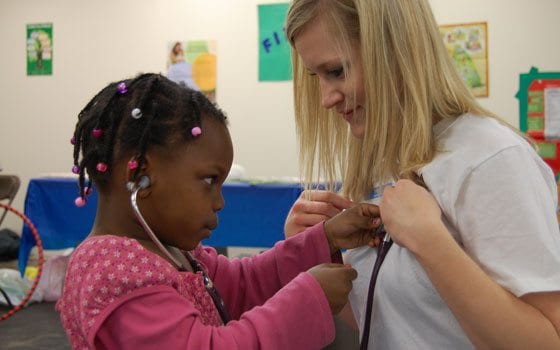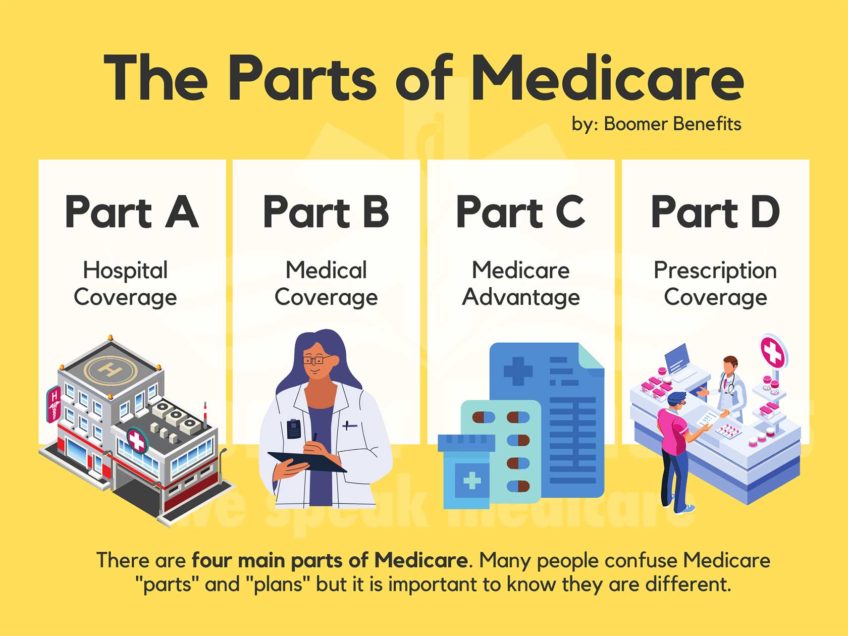
A crew of area medical students stepped away from labs and libraries to practice what they study while helping the community at the Healthier Life Steps Health Fair last month at the Save-A-Lot in Roxbury.
Students from the state’s four medical schools at Boston University, Tufts University, University of Massachusetts and Harvard University weighed people, pricked fingers and cuffed arms to measure blood sugar and blood pressure. They also doled out advice and literature on nutrition, exercise, women’s health and smoking cessation.
Conducted by the Medical Student Section of the Massachusetts Medical Society (MMS), the event attracted about 140 people.
Leroy Berry, 53, of Roxbury, was one of the first visitors. He stepped on a scale to have his height and weight measured, but declined the blood pressure cuff.
“I already know I have high blood pressure,” he said, “But I’ll be back later with my wife and my grandkids.”
Berry is already taking medication to control his blood pressure and has a primary care physician monitoring it, he said. Still, he was glad the health fair was happening.
“A lot of black people should get their blood pressure checked,” he said.
Al Berry, Leroy’s brother, decided to complete the circuit of screening and information stations set up around the room. He, too, has a primary care physician, but found the health information interesting. He picked up some literature about quitting smoking. And the free screenings did provide one bit of news for him — his blood-sugar level was higher than expected.
Many participants said they have a regular doctor, said event coordinator Ryan Seibert, a second-year medical student at Boston University Medical School and governing council member of the MMS Medical Student Section.
But that doesn’t necessarily translate into adequate health checkups, he noted. For instance, a woman with a strong family history of diabetes said her doctor had never measured her blood sugar. At the health fair, her test showed she had elevated blood sugar. She went away with a plan to discuss this new information with her doctor.
At the body mass index (BMI) measurement station, a participant expressed shock that her BMI indicated obesity. “That’s scary!” she said.
Most of the screenings showed normal or only slightly out-of-range readings, though, in one case, an elderly woman with a very high blood-pressure reading was advised to have her daughter take her to a clinic as soon as possible, said Seibert.
The MMS Medical Student Section conducts a service event every year, Seibert said, but this event had more emphasis on nutrition than previous events did and was more interactive.
“We’re looking at this as a way to serve the community, but also to learn from them. We learn; they learn. It’s not one-way,” he said.
Besides imparting health information to the community, health fairs give medical students a chance to get outside their school environment and practice talking with real people about health.
“When you’re in your first year, you don’t usually get to see patients,” said volunteer Daria Thompson, a first-year student in a joint degree program for a doctor of medicine (M.D.) and a master’s in public health (M.P.H.) at Tufts Medical School. Thompson spent part of the day informing participants of the sugar content of various sodas and fruit drinks.
Keelin Roche, also in the Tufts M.D./M.P.H. program, staffed the area with a display of pamphlets about alcohol and smoking. She got a quick education in listening and asking questions as participants told her things they might not reveal to their regular doctors about drinking alcohol and smoking — both cigarettes and marijuana.
The biggest eye-opener for visitors to her table, she said, was a flyer about the coverage MassHealth provides for stop-smoking medications and counseling.
Besides the 18 or so students of medicine, public health and nutrition, there was a medical doctor on the premises.
Dr. Burton Mandel is chair of the MMS Committee for Senior Volunteer Physicians, a group of retired and semi-retired doctors who volunteer their time at free clinics around Massachusetts. He was there to field questions from participants and students and to advise people on cases where screenings revealed a serious problem.
A participant asked Mandel about her high blood-sugar reading. He posed questions to her: “Have you eaten anything today? Taken any medications?” No to the first; yes to the second.
He suggested she have her blood sugar tested again in four to six weeks. He also advised her to pay attention to her weight, stay off sweets and not drink soda. And to exercise.
“I walked all the way here!” she protested.
Like the Berry brothers, this woman has a regular doctor. But many community residents do not see a doctor often enough, Mandel said. And that’s where these free screenings can be of particular help.
“The name of the game with this type of fair is to attract people that don’t normally go to a doctor,” he said, “either because they have no insurance or because they’re just not comfortable with doctors.”
Others, especially the elderly and those needing chronic care, may simply have difficulty getting to appointments.
Some participants learned as much from the nutrition and fitness stations as from the medical screenings. Martha Jefferson, 53, pointed around the room at all the tables where she learned something. She found it helpful to be instructed on reading nutrition labels for health and weight control, she said, and to hear about sugar and caffeine levels in soda.
“They also said — do something to exercise. It’s important,” she said. “I just happened by here today — and I’m glad I did.”
Mandel, a dedicated volunteer at the tail end of his medical career, had high praise for his younger counterparts.
“It’s underreported and underrecognized, but medical students are very concerned with serving people who are otherwise marginalized,” he said. “I think [these students] share my belief that health care should be a right, not a privilege.”






